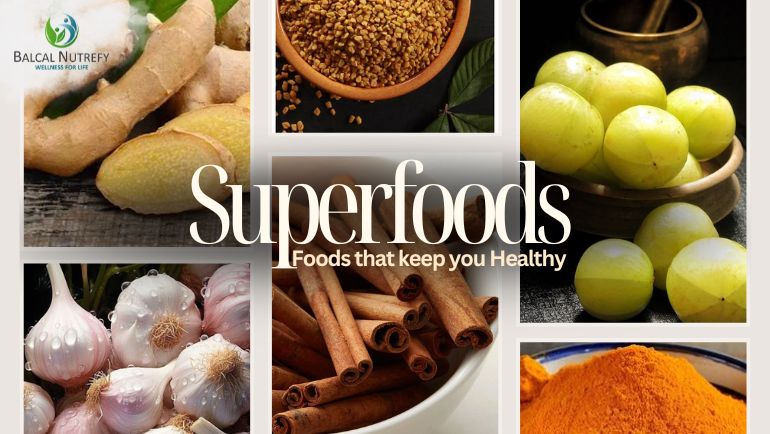Superfoods are healthy foods which are nutrient rich and give various health benefits. They are full of essential micronutrients like vitamins, minerals, antioxidants promoting heart health, enhancing energy levels and preventing chronic diseases like diabetes and cancer. In country like India, having a rich heritage of culinary traditions, superfoods are a part of our diet for years, giving us a treasure full of health benefits. These superfoods are known for the nutritional density they offer with a minimum calories and tons of nutrition. They add color, flavor, aroma and variety to our diet.
Besides all these benefits, we need to understand that not one food can act as superfood individually and provide nutrients and energy required. Superfoods are effective when paired with healthy eating routines from all food groups and limiting the calorie intake while balancing the macronutrients.
While there are no standard criteria or legal definitions for superfoods, superfoods are a diverse collection of nutrient-rich natural foods such as berries, seeds, grains, algae, vegetables and fruits, which can have a positive effect on the body. They contain a large percentage of vitamins, minerals, enzymes, amino acids and antioxidants. Unlike most healthy foods, which normally contain two or three particular nutritional properties, superfoods often have 12 or more.
Why are superfoods important?
Modern / current diet is not as nutritious as it should be. There is an abundance of unhealthy foods available, which are often easier to prepare and quicker to eat than the healthy food options
However, unhealthy eating is not good for the body, for the skin, hair, immune system and longevity. It even impacts emotional state. Whereas a daily diet that includes superfoods gives the body everything it needs to run smoothly and stay healthy.
What are the benefits of superfoods?
Each superfood has its specific characteristics and offers some typical health benefits. Some of the basic qualities of superfoods are –
- Improving physical and mental health
- Strengthening the immune system
- Increasing resistance to disease
- Improve metabolism
- Rejuvenate the skin
- Help reduce the risk of cancer and protects heart.
- When incorporated into a well-balanced diet, these foods can promote heart health, weight loss, improve energy levels and even reduce the effects of aging.
Let’s us look at some of the commonly used superfoods or available superfoods that can be
incorporated for maximum health benefits –
1. Cinnamon
Commonly used and most important spice all over the world. Primarily contains vital oils and other derivatives, such as cinnamaldehyde, cinnamic acid, and cinnamate. Apart from being rich in antioxidants, it also contains anti-inflammatory, antidiabetic, antimicrobial, anticancer, lipid-lowering, and cardiovascular-disease-lowering properties. Cinnamaldehyde present in it helps to reduce the swelling and prevent blood platelets from clumping together. Helps manage blood sugar and type 2 diabetes mellitus.
Contains a compound called-cinnamate that may decrease enzyme activity that makes cholesterol, thus reducing the number of fatty acids in the blood. It helps to reduce bad cholesterol in the body thereby reducing the risk of heart diseases.
Among many other benefits of cinnamon a few are – combats acne, protect against cancer, helps keep the skin shiny and smooth, relieves digestive problems, helps to manage polycystic ovarian disease (PCOS) symptoms.
Daily intake of ½ to 1 teaspoon per day (around 2-5 gms) is recommended for the benefits.
2. Methi Seeds / Fenugreek Seeds
Fenugreek seeds are an everyday staple in Indian cooking. Used as a traditional alternative medicine to relieve pain and other ailments.
Contain several bioactive compounds like phytochemicals that are phenolic acids, galactomannan, steroids, flavonoids, alkaloids, and hydrocarbons.
Anticarcinogenic Effects: Fenugreek seeds show potential anti-metastatic properties in several cancers. These include breast, skin, gastrointestinal tract, leukemia, lung and prostate cancer.
Antidiabetic Effects: Fenugreek seeds have anti-diabetic and hypoglycemic effects on people. Therefore, it helps manage type1 and type2 diabetes complications. In addition, research shows its usage as an anti-diabetic medication. Furthermore, fenugreek has a low glycemic index, making it a safe and healthy food for diabetes.
Anti-inflammatory Effects: Fenugreek seed mucilage shows anti-inflammatory effects. It reduces pain, swelling and promotes wound healing.
Analgesic, or Pain-relieving Effects: Fenugreek seed water, or fenugreek seed tea, is consumed to relieve cramps, nausea, and fatigue during menstruation.
Hypocholesterolemic Effect: Among other benefits, fenugreek seeds lower serum cholesterol, triglycerides and LDL content in the blood. It helps to reduce obesity and fasten weight loss.
According to research, the bioactive compound saponin in fenugreek seeds is to thank for this property. According to a research, approximately 10 grams of fenugreek seeds (Preferably soaked) if consumed in the morning on empty stomach have helped in management of diabetes and other health concerns.
3. Turmeric
Contains antioxidant and anti-inflammatory properties. Curcumin is the active ingredient found in turmeric that has immune boosting properties.
Some studies suggest that turmeric’s ability to reduce inflammation can help with a number of conditions, such as: Arthritis, Asthma, Cognitive function, Crohn’s disease, Eczema and psoriasis, Gastrointestinal conditions, Heart health, Overall pain management and Respiratory tract health.
Doctors commonly recommend taking 500 milligrams twice daily with food. It’s safe to take up to 8 grams per day, but a lighter dosage of 500 to 1,000 milligrams a day for the general population is also beneficial. For optimal absorption, try taking with heart-healthy fats like oils, avocado, nuts and seeds, etc.
Bioavailability: piperine is the major active component of black pepper and, when combined in a complex with curcumin, has been shown to increase bioavailability by 2000%.
4. Ginger
An important spice ginger root or powder is a core ingredient in the Asian cooking and other countries.
The bioactive component of Ginger, called “gingerol,” along with its 31 related compounds, is the source of Ginger’s beneficial properties.
Digestive Support: Ginger supports digestion by helping with the release of excess gas and movement of food through the digestive tract.
Warming: When added to teas and health elixirs, Ginger has a very warming and comforting effect, bringing a sensation of wellness to the body and mind.
Antioxidant Action: Ginger contains antioxidants that help detoxify the body, protect against oxidative stress and support a healthy inflammatory response.
Respiratory Support: Ginger’s ability to support a healthy inflammatory response helps clear the respiratory system of toxins and soothe the lungs.
Pain Relief: Ginger is found to help soothe minor pain induced by exercise for better recovery, as well as relieve menstrual cramps.
Cardiovascular Health: Ginger may help protect the heart by supporting healthy blood pressure and relaxing the arteries.
5. Garlic
Garlic contains compounds that help the immune system fight germs. Whole garlic contains a compound called alliin. When garlic is crushed or chewed, this compound turns into allicin, the main active ingredient in garlic. May help lower blood pressure, cholesterol & the risk of heart diseases.
Garlic’s high vitamin-C content and antimicrobial properties make it a significant and potent immune-system booster and it is very effective against bacterial, viral, fungal and parasitic infection. Allicin enhances the activity of phagocytic cells and natural killer cells whilst it inhibits the growth of pathogenic micro-organisms and certain cancer cells.
One clove raw to be eaten 2-3 times a day. Aged garlic supplement (When raw garlic has been sliced and stored in 15-20% ethanol for over 1.5 years, it becomes aged garlic extract) a normal dose is 600 to 1200 mg per day.
Tips to maximize the benefits of garlic:
- Crush or slice all your garlic before you eat it. This increases the allicin content.
- Before you cook with your crushed garlic, let it stand for 10 minutes.
- Use a lot of garlic – more than one clove per meal, if you can.
Raw vs. Cooked Garlic: What’s the nutritional difference?
Allicin is more heat-resistant than the enzyme, Brazilian researchers found that exposing garlic to high temperatures (like burning the garlic) can destroy it, so it’s best to add crushed garlic to food right before it’s done cooking.
Alternatively, crushed garlic raw can be used in salad dressings, salsas, pesto, chutney, etc.
Garlic Pearls or Raw Garlic?, which form is Healthy?
Medical research links garlic to a number of health benefits. However, some studies have suggested that raw garlic may be more effective than the cooked version, while garlic supplements are the most effective.
6. Moringa
Moringa is packed with many important vitamins and minerals. It contains vitamin A, B, good source of vitamin C, calcium, iron, zinc and potassium. Moringa can help to treat diabetes, inflammation, infection, joint pain, heart problems, and even cancer. The leaves have seven times more vitamin C than oranges and 15 times more potassium than bananas. Antioxidants present in moringa protect cells from damage may help boost immune system. Helps in reducing the blood sugar. Helps lower the redness and pain in rheumatoid arthritis.
No harmful effects were observed but people can take between 2-8 gms of moringa powder daily.
Avoid in pregnancy – Chemicals in the root, bark, and flowers might make the uterus contract. In traditional medicine, the root and bark were used to cause miscarriages.
7. Amla
Amla or the Indian gooseberry is a fruit which is popular for its many health benefits. The fruit is extremely rich in Vitamin C, iron and calcium. Amla is a superfood which is inexpensive.
It has eight times more vitamin C than an orange, twice the antioxidant power of acai berry, and around 17 times that of a pomegranate. Amla’s antibacterial and astringent properties boost one’s immune system. It beautifies hair and improves the skin.
Is loaded with chromium that aids in reducing bad cholesterol and also helps stimulate insulin production, thereby reducing the blood glucose level of diabetics.
Be it arthritis-related joint aches or painful mouth ulcers, amla can provide relief owing to its anti-inflammatory properties.
The vitamin C in amla is absorbed more easily by the body compared to store-bought supplements. Studies have shown that the carotene in amla improves vision. Contains 600 mg of vitamin C per 100 gm of serving.
If you want to get started on your wellness journey please feel free to reach out by filling out the contact form on our website. We look forward to assist you on your wellness journey to better health and sustainable lifestyle.
Follow us on: Instagram, Facebook, Youtube and Stay Tuned for more such insightful & informational blogs & videos along with some delicious & healthy recipes.




